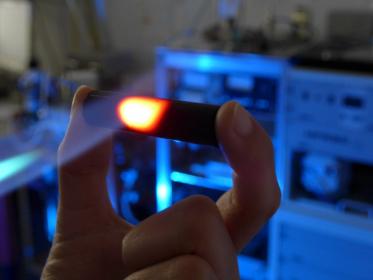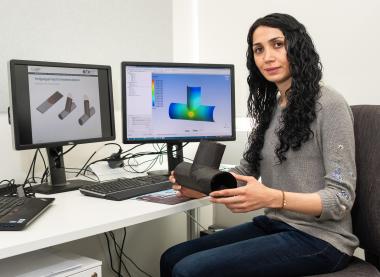Consortium develops new generation of thermal insulation for high-temperature furnaces
In the joint project "AeroFurnace" funded by the German Federal Ministry of Economic Affairs and Energy (BMWi), the consortium, consisting of the Bavarian Center for Applied Energy Research e.V. (ZAE Bayern) as joint coordinator, the furnace manufacturer FCT Systeme, and SGL Carbon has succeeded in improving the thermal insulation properties of a new composite material by up to 120 percent compared to commercially available felt-based carbon materials. This enabled the project partners to move into a new quality level of thermal insulation in high-temperature industrial applications and pave the way for more energy efficient thermal insulation.
Dr. Gudrun Reichenauer, coordinator of the joint project and head of the work group Nanomaterials at ZAE Bayern: "In this project, we have been able to make the latest findings from the world of nanomaterials accessible to the market through intensive cooperation and thus set new standards in the field of thermal insulation materials."
Dr. Thomas Kirschbaum, project manager at SGL Carbon: "In furnace simulations at the partner FCT, we have already been able to demonstrate what the new material can do: Depending on the temperature program, up to 40 percent of the required process energy can be saved with the new thermal insulation material. The potential of the new material is great." This prediction will be reviewed under real conditions in a demonstrator component in the second half of 2020 as part of the still ongoing BMWi project.
Dr. Jürgen Hennicke, project lead and head of R&D at FCT Systeme: "As a leading manufacturer of industrial vacuum or inert gas high temperature furnaces, the new generation of insulating materials enables us to create furnaces with a more favorable ratio of usable space to external dimensions, thus offering customers improved cost efficiency and productivity".
Based on laboratory samples in plate form it has already been demonstrated that the production of the new material can be represented by technically simple processes and is in principle well scalable. However, there is still a long way to go before the product is ready for serial production.
The third largest share of final energy in Germany is used for the generation of heat in industrial processes (22.6 percent). In many industries, e.g. in the steel and ceramics industry, energy-intensive high-temperature processes run above 1000°C – these alone require almost 50 percent of the industrial process heat. Suitable thermal insulation materials can significantly reduce energy demand while maintaining the same usable volume.
SGL CARBON SE






